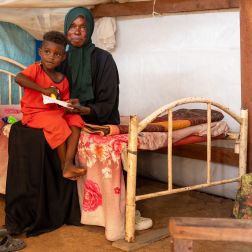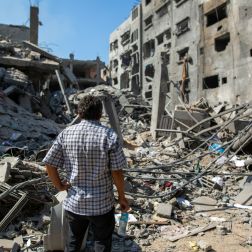
Fuel is now very, very rare… for drinking water, already the quality of the water well is so bad that it’s not drinkable
- 7 mins read time
- Published: 17th November 2023
Gaza: Six ways the destruction of water supplies is having a devastating impact
The current crisis comes on top of a long-standing struggle for water in Gaza – and demonstrates again how access to clean water is often one of the first casualties of conflict. Bushra Khalidi and Awssan Kamal set out six ways the destruction and obstruction of water supplies is having devastating short- and long-term impacts on civilians.

With Gaza’s over two million people under siege, the water situation is desperate. However, it’s crucial to acknowledge that the current hostilities have exacerbated a crisis that was already pushing Gaza to the brink. For the past 16 years, Gaza has endured the weight of an ongoing blockade, which has severely hampered the region’s ability to manage essential resources, particularly water.
The UN Water, Sanitation and Hygiene (WASH) cluster, of which Oxfam is a member, says that only three litres of water a day are now available per person in Gaza. To put this into perspective, the World Health Organisation recommends in an emergency one person needs between 7.5 and 20 litres of water each day to meet basic health needs. Bottled water stocks are running low and the cost of bottled water has already surged beyond the reach of an average Gaza family. In Gaza, water has become a luxury item.
BOMBS ARE DESTROYING WATER INFRASTRUCTURE AND PREVENTING WORK TO RESTORE SUPPLIES.
Gaza’s essential water and sanitation infrastructure is being destroyed as the bombing and conflict escalates. Another critical factor is that Israel has been cutting off or severely limiting water supplies as well as supplies of power, with a blockade on the fuel that keeps power plants running. Water trucking operations (bringing in water in lorries) are severely hampered or have stopped in northern parts.
In her diary from Gaza, Najla Shawa, who works for Oxfam, explains: “Fuel is now very, very rare… for drinking water, already the quality of the water well is so bad that it’s not drinkable, and at the same time it’s another effort, another journey that takes us to find a water tanker…We’re talking about a real crisis… people who are unable to use toilets in shelters, they hardly have water.”
These pressures mean people in one of the most densely populated parts of the world will soon run out of drinkable water and diseases such as cholera could spread. Over two million people cannot wash their hands after going to the toilet and some of our own Oxfam colleagues are sheltering in overcrowded flats with 50 people or more. The UN Office for the Coordination of Humanitarian Affairs (OCHA) reports that its health partners have already “detected cases of chicken pox, scabies and diarrhea, attributable to the poor sanitation conditions and consumption of water from unsafe sources”.
On 6th October only one of three desalination plants capable of producing 7% of Gaza’s water supply was operational, with reduced capacity due to the blockade on electricity and fuel. All five of Gaza’s wastewater treatment plants and most of its 65 sewage pumping stations have been forced to shut down. This dire situation has led to untreated sewage discharged directly into the sea and, solid waste accumulating in the streets. Municipal staff are struggling to access some of the water wells producing brackish water. UNRWA and UNICEF distributed limited amounts of fuel to 120 municipal water wells across the Gaza Strip, including in the north, enough for the wells to operate for about two days. And water aid in the form of bottles and jerry cans coming from Egypt is only addressing 4% of the needs.
All of this comes on top of a water system that was already at breaking point even before this conflict (see graphic above). This video from 2022 highlights how the depletion of Gaza’s coastal aquifer, decrease in rainwater, and doubling of the population over the last 20 years, led to just 1% of Gaza’s population having access to safe drinking water before the current wave of infrastructure destruction.

SIX DEVASTATING IMPACTS WHEN CONFLICT DESTROYS WATER SECURITY
The Gaza water crisis is a stark reminder of the devastating impact of conflict escalation on water supplies and other critical services, pushing already vulnerable communities to the brink. In Gaza, where the water situation was already fragile after a blockade that has been ongoing for 16 years, the consequences are especially dire.
Here are six ways in which the destruction of water and sanitation networks along with the blockade on water and power supplies exacerbates civilian suffering.
- Most Gazans are forced to resort to non-potable water sources, including saline-brackish agricultural wells, exposing themselves to waterborne diseases, most notably cholera, with health repercussions that extend far beyond the immediate effects of conflict.
- Sewage and solid waste are piling up on the streets, posing significant health hazards. With sewage systems and wastewater treatment plants non-operational due to a lack of fuel, over 130,000 cubic meters of wastewater is being discharged into the Mediterranean Sea daily.
- Lack of water affects personal hygiene, further raising the risk of diseases. Children under five are particularly vulnerable to this water shortage, facing the risk of diarrheal diseases. This represents a tragic escalation of civilian suffering, with the youngest the most severely impacted.
- The lack of water is having a heavy impact on women and girls. With limited water, mothers struggle to make baby formula, and the conflict trauma is affecting breast milk production. (Watch Regional Humanitarian Coordinator Ruth James talk about formula and breast milk here) The scarcity of water and lack of privacy in overcrowded conditions also make menstrual management a significant challenge, leading many women to take medication to alter menstrual cycles. Additionally, lack of water exacerbates the dire healthcare situation (see below), with over 50,000 women at risk of giving birth in non-operational hospitals that lack supplies. This not only endangers women’s physical health but also their dignity and emotional well-being..
- Lack of water in hospitals in Gaza is putting the lives of thousands of inpatients at immediate risk. Water is of course essential for maintaining sanitary conditions in hospitals, preventing hospital-associated infections, and saving the lives of patients in critical care. Healthcare workers need water to keep going and do their jobs.
- The lack of wastewater treatment and the discharge of sewage into the sea will cause environmental damage that could have long-term consequences for the region’s ecology, and damage civilians’ livelihoods.
The breadth and devastating scale of these impacts spell out exactly why we urgently need international action on water in Gaza.
WHAT IS OXFAM DOING IN GAZA?
Oxfam partners have begun a small distribution of soap, shampoo, menstrual products and toothpaste but the scale of need and logistical chaos pose massive challenges to humanitarian response. The world cannot leave 2.3 million people struggling to survive without access to clean water, which is a fundamental human right.
Cutting off water represents a clear violation of international humanitarian law (IHL), which explicitly protects vital civilian infrastructure, including water systems (UN Security Council Resolution 2573). Urgent international action is needed to prevent a catastrophe of unimaginable proportions and to address the immediate and long-term consequences of the Gaza water crisis
That’s why we have been calling for an immediate ceasefire and for Israel to restore water to Gaza. A ceasefire will enable agencies including Oxfam to respond, and much of that operation will be around water: providing people with clean water, distributing sanitation and hygiene items, and rehabilitation of water and wastewater networks that have been destroyed in the bombing. That response cannot come soon enough.

Hear directly from our team on the Gaza crisis.





